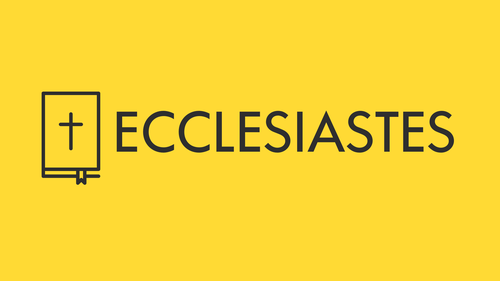Ecclesiastes 9

Today's Passage: Ecclesiastes 9
There is so much wisdom shared by the Teacher in Ecclesiastes. Chapter 9 offers several proverbial nuggets of wisdom. However, the nucleus that all of these nuggets surround might be something like, “Don’t waste your death.”
No person knows what’s around the corner. We can be certain of only one thing (with very few exceptions), if the Lord tarries, no person escapes death. The Teacher examined all of life and seems to focus on that as a hugely important aspect of life. It’s morbid, and not something that many of us choose to reflect on too often.
The Teacher says in so many words, “life is better than death.” Even life as an unclean and shameful dog is better than a dead venerated respected lion. The living have one thing the dead no longer possess—hope. The seeds of eternity are only planted in life. Death means reaping the fruit. As we know, especially through the lens of the New Testament, a life sown in wisdom leads to great reward. However, a life sown in folly has no hope.
Not wasting your death means that we should enjoy life and the fruit of our work. However, the only thing better than life is wisdom. “Time and chance happen to them all.” Wisdom is the cure for any circumstance in which we find ourselves. Whether on the mountaintop or in the valley, wisdom is better than just living.
The Teacher says basically, the life of a wise poor man is better lived than a foolish king. Think about that for a moment. I think one reason may be that with wisdom comes contentment. The king sought to increase his greatness by taking another city—yet he will one day be a dead lion. The poor man, seemingly aware of his own end, is the living dog.
As I think about this passage, I’m challenged by several questions:
1.What am I trying to do and why am I trying to do it? Am I the foolish king trying to expand my kingdom?
2.Are there areas of folly in my life causing me to lack contentment?
3.What gifts of the Lord do I enjoy or should I be enjoying more than I do?
4.What do I want to have been true of me at the end of my life, what’s holding me back from living that way now?
Written By: Tyler Short
There is so much wisdom shared by the Teacher in Ecclesiastes. Chapter 9 offers several proverbial nuggets of wisdom. However, the nucleus that all of these nuggets surround might be something like, “Don’t waste your death.”
No person knows what’s around the corner. We can be certain of only one thing (with very few exceptions), if the Lord tarries, no person escapes death. The Teacher examined all of life and seems to focus on that as a hugely important aspect of life. It’s morbid, and not something that many of us choose to reflect on too often.
The Teacher says in so many words, “life is better than death.” Even life as an unclean and shameful dog is better than a dead venerated respected lion. The living have one thing the dead no longer possess—hope. The seeds of eternity are only planted in life. Death means reaping the fruit. As we know, especially through the lens of the New Testament, a life sown in wisdom leads to great reward. However, a life sown in folly has no hope.
Not wasting your death means that we should enjoy life and the fruit of our work. However, the only thing better than life is wisdom. “Time and chance happen to them all.” Wisdom is the cure for any circumstance in which we find ourselves. Whether on the mountaintop or in the valley, wisdom is better than just living.
The Teacher says basically, the life of a wise poor man is better lived than a foolish king. Think about that for a moment. I think one reason may be that with wisdom comes contentment. The king sought to increase his greatness by taking another city—yet he will one day be a dead lion. The poor man, seemingly aware of his own end, is the living dog.
As I think about this passage, I’m challenged by several questions:
1.What am I trying to do and why am I trying to do it? Am I the foolish king trying to expand my kingdom?
2.Are there areas of folly in my life causing me to lack contentment?
3.What gifts of the Lord do I enjoy or should I be enjoying more than I do?
4.What do I want to have been true of me at the end of my life, what’s holding me back from living that way now?
Written By: Tyler Short


1 Comment
Trying to parent well because I love my kids, but having trouble with contentment sometimes because maybe I'm too expectant of having a loving relationship when that always can't be an expectation in our fallen world (v. 1c). I needed this chapter's exhortation to keep trying hard while maintaining a cheerful heart & calm words (vv. 7 & 17).